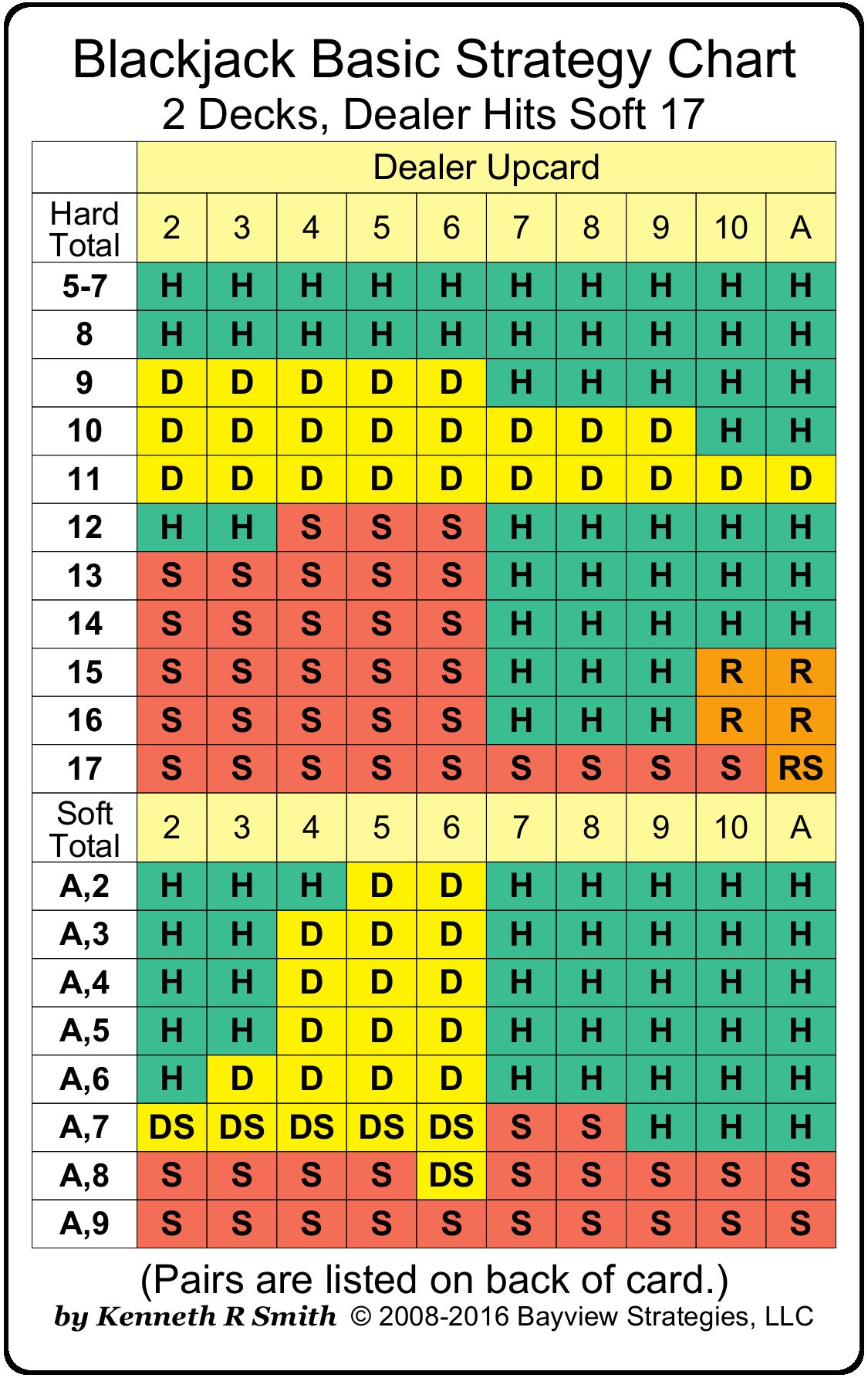Blackjack 2 Deck Strategy
Hit or Stand gameplay is based on Atlantic City and Las Vegas multiple deck casinos rules. Blackjack rules vary from casino to casino, which makes learning blackjack strategy more complicated. However, many correct moves are fundamental enough that they do not differ from casino to casino, and most large scale casinos have very similar rules - usually matching those in Vegas or A.C.. The strategy tables for Vegas and A.C. are displayed below. To find strategy tables for a particular casino, you can visit BlackJack Info, a site that can generate customized tables.

Basic Blackjack Rules:
- The goal of blackjack is to beat the dealer's hand without going over 21.
- Face cards are worth 10. Aces are worth 1 or 11, whichever makes a better hand.
- Each player starts with two cards, one of the dealer's cards is hidden until the end.
- To 'Hit' is to ask for another card. To 'Stand' is to hold your total and end your turn.
- If you go over 21 you bust, and the dealer wins regardless of the dealer's hand.
- If you are dealt 21 from the start (Ace & 10), you got a blackjack.
- Blackjack usually means you win 1.5 the amount of your bet. Depends on the casino.
- Dealer will hit until his/her cards total 17 or higher.
- Doubling is like a hit, only the bet is doubled and you only get one more card.
- Split can be done when you have two of the same card - the pair is split into two hands.
- Splitting also doubles the bet, because each new hand is worth the original bet.
- You can only double/split on the first move, or first move of a hand created by a split.
- You cannot play on two aces after they are split.
- You can double on a hand resulting from a split, tripling or quadrupling you bet.
2 Deck Blackjack Strategy Chart Pdf

Blackjack Appendix 3C lists exceptions to the single deck, dealer hits on soft 17, basic strategy based on the exact composition of the player's hand. Boss Media Appendix 1 has a composition dependent basic strategy for single-deck, dealer stands on soft 17, blackjack. Many casinos today pay blackjacks at less than 3:2 at some tables; for instance, single-deck blackjack tables often pay 6:5 for a blackjack instead of 3:2. Blackjack games almost always provide a side bet called insurance, which may be played when dealer's upcard is an ace. Additional side bets, such as 'Dealer Match' which pays when the player. EXAMPLES OF HOW TO USE THE BLACKJACK BASIC STRATEGY. Single-deck game with hard 17, you hold 16, dealer’s upcard is a 10. You should surrender. Double-deck game with soft 17, you hold 15, dealer’s upcard is an ace. You should hit (surrender only against dealer’s 10). Six-deck game with soft 17, you hold 16, dealer’s upcard is a 9. Blackjack in a 6 deck or 8 deck shoe in Vegas typically pays 3:2, but there is a recent and disturbing trend for the big casinos to have blackjack tables that only pay 6:5 on tables with a shoe. The casinos are targeting casual players that are not aware of this difference.
For more information about Blackjack rules,strategy, and etiquette you can visit Hit or Stand's recommended book list.

Below you will find the strategy tables for both Atlantic City and Las Vegas. These table are what the Hit or Stand games is based on. Hit or Stand accepts a correct move from either Vegas or A.C.(they differ only slightly). It needs to be noted that using the below tables will not cause you to make money - the odds are still against you. The only way to put the odds of Blackjack in you favor is to count cards which is a large topic of its own.

Blackjack 2 Deck Strategy
Las Vegas Multiple Deck
| Atlantic City Multiple Deck
| ||||||||||||||||||||||||||||||||||||||||||||||||||||||||||||||||||||||||||||||||||||||||||||||||||||||||||||||||||||||||||||||||||||||||||||||||||||||||||||||||||||||||||||||||||||||||||||||||||||||||||||||||||||||||||||||||||||||||||||||||||||||||||||||||||||||||||||||||||||||||||||||||||||||||||||||||||||||||||||||||||||||||||||||||||||||||||||||||||||||||||||||||||||||||||||||||||||||||||||||||||||||||||||||||||||||||||||||||||||||||||||||||||||||||||||||||||||||||||||||||||||||||||||||||||||||||||||||||||||||||||||||||||||||||||||||||||||||||||||||||||||||||||||||||||||||||||||||||||||||||||||||||||||||||||||||||||||||||||||
2 Deck Blackjack Strategy Chart
People often ask how it is known that the strategy tables such as the ones above are correct. They are created and validated in two ways: The first method involves applying probability theory which uses extremely complicated mathematics. The second technique involves using computers to simulate thousands of blackjack deals that are played using different strategies to see which combination of moves give the best end results (the moves that cause one to lose money the slowest).